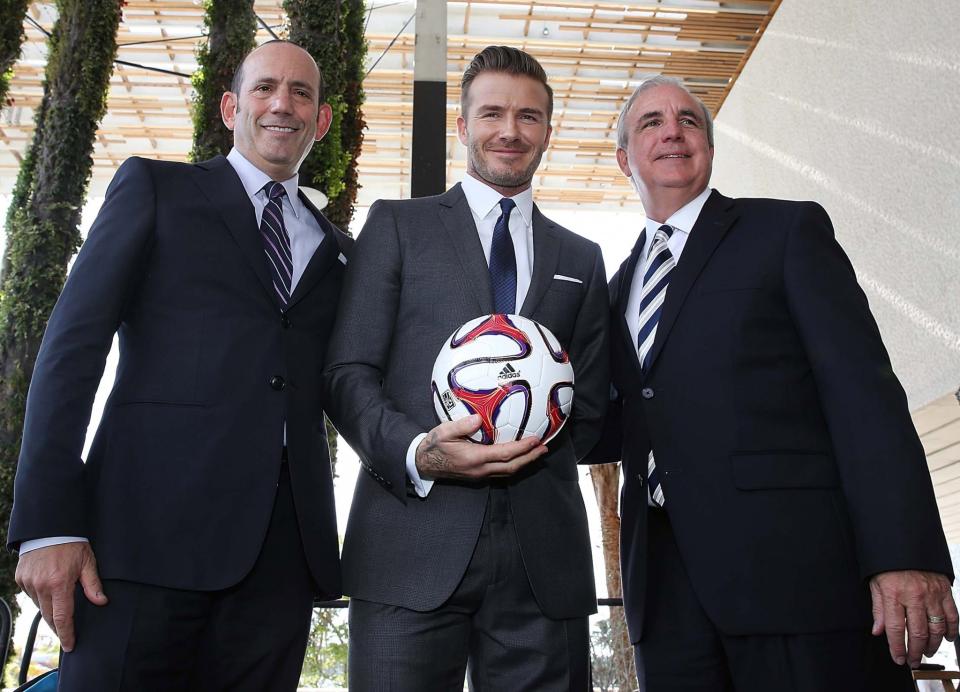1,000 days after David Beckham's MLS team announcement, is it time to give up on Miami?

Remember when David Beckham was going to become the owner of a Major League Soccer franchise?
When he activated the clause in his original contract with the league and the LA Galaxy that allowed him to buy the rights to a franchise at a $25 million price tag, now an outrageous bargain in the expansion fee hyperinflation wherein the cost of franchises to others was creeping towards nine figures? When he brought a slew of apparent heavy hitters along with him, sure to be able to crack through the legendary difficulty of getting a stadium built in Miami?
That was a long time ago. On Monday, in fact, it was 1,000 days ago.
On that sunny Wednesday morning of Feb. 5, 2014, Beckham, his business partners and league commissioner Don Garber announced that a team would be coming to Miami. When would it begin play? That was a question a fawning pack of local reporters, who were more interested in whether Beckham and his famous family would be moving to the city, barely even got to pose.
As it turns out, that was the crux of it. Because MLS’s awarding of the franchise was contingent on Beckham’s ownership group getting a stadium deal done. And when one targeted site after another – in Miami’s port, on its water front and then next to Marlins Park – fell through, pressing questions were asked. Late last year, Miami Beckham United, as the ownership is called, finally secured a lot in the historic but badly depressed Overtown neighborhood, but the land has apparently not even been closed on yet. Zoning hurdles might also remain. And the purchase of one section of the proposed stadium site still has to be negotiated, according to the Miami Herald. Also, The Telegraph reported that final lot won’t even be purchased until another investor into the ownership group is found, something that hasn’t happened yet.
“We are still working with the investor group to finalize their stadium situation and to solidify their total ownership structure,” Garber told Sports Illustrated last month. “It has taken more time then all of us had hoped.”
Needless to say, a proposed 2017 start date for the team proved far too soon, and now even 2018 is looking ambitious.
David Beckham, November 2013: "Hopefully there will be an announcement before the new year" pic.twitter.com/b182rGUMc5
— Robert Andrew Powell (@robertandrewp) September 2, 2015
David Beckham, February 2014: "two to three years we'll hopefully have the stadium built” pic.twitter.com/bGL8M8lcdI
— Robert Andrew Powell (@robertandrewp) September 2, 2015
David Beckham, September 2015: “Hopefully in the next couple of months we'll be able to make an announcement" pic.twitter.com/mhpOJCdjpO
— Robert Andrew Powell (@robertandrewp) September 2, 2015
Meanwhile, Atlanta United, announced two months after the Miami team, is set to begin play next season. So is Minnesota United, announced almost 14 months after Miami. LAFC, announced almost nine months after Miami, looks set to kick off in 2018, for which Beckham’s team is still a question mark.
It leaves you wondering what it will take for the Miami ownership to lose its turn in line – especially with expansion fees now reportedly creeping towards $200 million. There is no shortage of major markets with an interest in an MLS team. Sacramento, St. Louis, Las Vegas, San Antonio, San Diego and Detroit are all viable and interested potential expansion towns somewhere along in the process of putting together strong ownership groups and sound stadium plans.
Miami is obviously an attractive town to expand into for its cultural and cosmopolitan cachet. But it still hasn’t demonstrated, as a city, that it’s all that interested in supporting an MLS team. The Miami Fusion, of course, lasted only four seasons, albeit in a dinky high school stadium out in Fort Lauderdale. This is a different time in MLS, although the history of failure in South Florida re-emphasizes the need to get Beckham’s stadium right. But more acutely, Miami is a question mark. Will it consistently and ardently support a professional team in any sport over the course of decades, rather than just a few years of on-field success? Does anybody really know this for sure?
At what point is Miami more trouble than it’s worth? Other cities are actually enthused about having an MLS team, both in their legislature and would-be fan bases, with a long record of supporting local teams no matter their performance. Detroit has a semi-pro soccer team that pulls in more than 5,000 per game, an astonishing figure at that level. St. Louis is the historic home of the American game and has a Rams-shaped hole in its heart now that the NFL has left town. San Diego is bleeding soccer fans to the Xolos, just over the border in Tijuana. Sacramento and Las Vegas have ample disposable incomes and a shortage of pro sports.
And the thing is, you could think of a half dozen other places that could conceivably do better – and do so more quickly – than Miami.
There’s no telling what kind of legal entanglements would present itself if MLS tried to pull out of its semi-commitment to Beckham and Miami – or to ask him to move his would-be franchise elsewhere. But if it’s at all possible, the time to give up on Miami isn’t another 1,000 days away.
It’ll be much sooner than that.
Leander Schaerlaeckens is a soccer columnist for Yahoo Sports. Follow him on Twitter @LeanderAlphabet.



